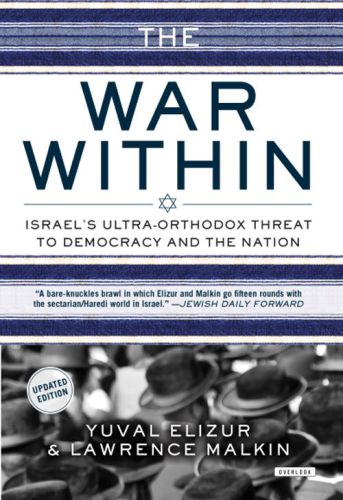
The War Within
Israel's Ultra-Orthodox
کتاب های مرتبط
- اطلاعات
- نقد و بررسی
- دیدگاه کاربران
نقد و بررسی

March 4, 2013
A mysterious late night phone call to Israeli journalist Elizur sets the stage for this investigative piece, co-authored with fellow journalist Malkin and originally published in Hebrew in 2009, in which the pair examine the growing internal divide Israel faces from their own Ultra-Orthodox (haredi) population. Several key issues lurk beneath this rift between the haredim and other Jews: a lack of military support by the haredim, who are generally exempt from conscription; single track education that focuses exclusively on Talmudic studies and does not prepare men to work outside the yeshiva; financial subsidies from right-wing parties to support their large families because the men do not work; and unequal rights of women. The authors do present some quotidian challenges facing "the haredim, who isolate themselves from the wider world while trying to impose their values on it": smartphones and the Internet are at once considered both tools of commerce and dangerous elements of modern times, offering access to a world outside narrow rabbinical authority and censorship. Though one criticism of the book is that several exposed moments of internal haredi criticism occur under a veil of secrecy, the greater social and political issues remain salient and troubling.

January 15, 2013
Two engaged journalists offer an anxious look at how the "ultras" gained their troubling political supremacy over a secular state. Veteran journalists Elizur and Malkin take on the ultra-Orthodox with knuckles bared. Despite the founding of Israel as a "state for Jews" and not a "Jewish state," David Ben-Gurion made a fateful compromise with the ultra-Orthodox party in order to gain support for statehood--with ramifications that are still felt today. The ultra-Orthodox Haredim create in their close-knit communities a deeply religious, segregated lifestyle: little exposure to the outside world, employment or schools and exemption from the requisite three-year military service--in short, an ideological fringe made up of 10 percent of the population that nonetheless holds obstructionist political power because of the clout, and subsidies, it has maintained traditionally by siding with the conservative Likud party. Indeed, in that founding compromise with Ben-Gurion, the ultra-Orthodox were awarded for their compliance the regulation of certain important aspects of daily life, namely Sabbath observance, dietary laws, marriage, divorce and education. And because Israel still hasn't managed to hammer out a constitution (including basic equal rights for women), the ultras still hold a lock on deciding who is a Jew, how people can marry and what is closed on the Sabbath. By rejecting secular influences, even the teaching of English and mathematics in their religious schools, the Haredim leaders keep control over their flock, the authors maintain, while impeding national progress and possibilities for peace and reconciliation in the country as a whole. A succinct, polemical debate urging the neutralization of the power of this religious minority for the good of Israeli society.
COPYRIGHT(2013) Kirkus Reviews, ALL RIGHTS RESERVED.

























دیدگاه کاربران